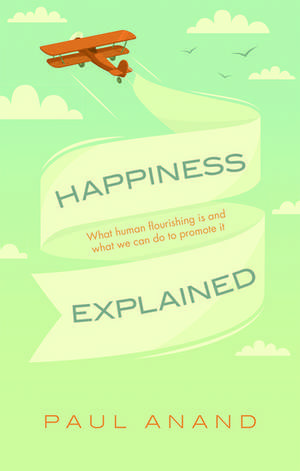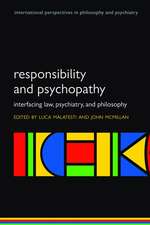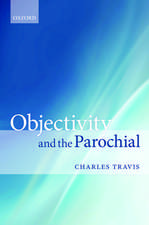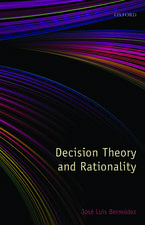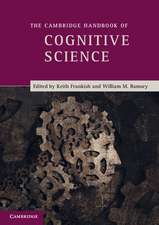Happiness Explained: What human flourishing is and what we can do to promote it
Autor Paul Ananden Limba Engleză Hardback – 17 mar 2016
Preț: 79.71 lei
Preț vechi: 89.03 lei
-10% Nou
Puncte Express: 120
Preț estimativ în valută:
15.25€ • 15.97$ • 12.62£
15.25€ • 15.97$ • 12.62£
Carte tipărită la comandă
Livrare economică 26 martie-01 aprilie
Preluare comenzi: 021 569.72.76
Specificații
ISBN-13: 9780198735458
ISBN-10: 0198735456
Pagini: 158
Ilustrații: 1 Table
Dimensiuni: 146 x 226 x 16 mm
Greutate: 0.32 kg
Editura: OUP OXFORD
Colecția OUP Oxford
Locul publicării:Oxford, United Kingdom
ISBN-10: 0198735456
Pagini: 158
Ilustrații: 1 Table
Dimensiuni: 146 x 226 x 16 mm
Greutate: 0.32 kg
Editura: OUP OXFORD
Colecția OUP Oxford
Locul publicării:Oxford, United Kingdom
Recenzii
An enjoyable and multifaceted tour... convincingly expounds the need for a rich conception of human well-being in order to quantify individual and social progress.
Happiness Explained is ... a useful primer for a non-technical reader setting out to understand this complex field
Paul Anand's brilliant book on happiness is also a fine contribution to the ethical foundations of economics. It combines exceptional lucidity with analytical rigour, and shows that the so-called dismal science need not be dismal at all.
A helpful introduction for beginners to the current state of happiness research
Economists are usually shy about happiness. Paul Anand is not. He writes with verve and clarity about ways to understand, measure, and promote human happiness. Drawing on psychology and philosophy as well as economics, he discusses how governments - and individuals - can increase the sum of happiness and quality of life. He offers a readable and intriguing guide to what ought to be - but rarely is - one of the most important policy issues for any government.
Seeks to answer the most important question of all . . . and makes a convincing case for a schooling that cultivates the mind while developing young peoples good character and wellbeing.
Essential reading for anyone who has questioned that we are simply homo economici motivated solely or even primarily, by individualism and the endless pursuit of material wealth... insightful as it is pragmatic.
Shows how the capability approach of Sen and Nussbaum can be made operational and integrates the most important insights from the booming empirical literature on subjective happiness. This book will be a source of inspiration for everybody who believes that material consumption is not the only contributor to individual wellbeing.
Happiness Explained is ... a useful primer for a non-technical reader setting out to understand this complex field
Paul Anand's brilliant book on happiness is also a fine contribution to the ethical foundations of economics. It combines exceptional lucidity with analytical rigour, and shows that the so-called dismal science need not be dismal at all.
A helpful introduction for beginners to the current state of happiness research
Economists are usually shy about happiness. Paul Anand is not. He writes with verve and clarity about ways to understand, measure, and promote human happiness. Drawing on psychology and philosophy as well as economics, he discusses how governments - and individuals - can increase the sum of happiness and quality of life. He offers a readable and intriguing guide to what ought to be - but rarely is - one of the most important policy issues for any government.
Seeks to answer the most important question of all . . . and makes a convincing case for a schooling that cultivates the mind while developing young peoples good character and wellbeing.
Essential reading for anyone who has questioned that we are simply homo economici motivated solely or even primarily, by individualism and the endless pursuit of material wealth... insightful as it is pragmatic.
Shows how the capability approach of Sen and Nussbaum can be made operational and integrates the most important insights from the booming empirical literature on subjective happiness. This book will be a source of inspiration for everybody who believes that material consumption is not the only contributor to individual wellbeing.
Notă biografică
Paul Anand is an economist involved in helping governmental organizations move beyond GDP. He has held posts at Oxford University where he obtained his doctorate on the foundations of rational choice. He has written extensively on quality of life issues through research funded by the Leverhulme Trust and the Arts and Humanities Research Board. He has contributed to a number of journal boards including the Journal of Economic Psychology and been a member of research commissioning panels for the ESRC and NHS. He also has long standing interests in the utilization of research having worked closely for a number of years with the Statistics Directorate of the OECD and the UK Office of National Statistics Task force. He is a professor of Economics Decision Sciences and Philosophy at the Open University and a research associate in Oxford University and the LSE. He has been a founder of the Oxford Foundation for Knowledge Exchange and is a Fellow of the Human Capability and Development Association.
